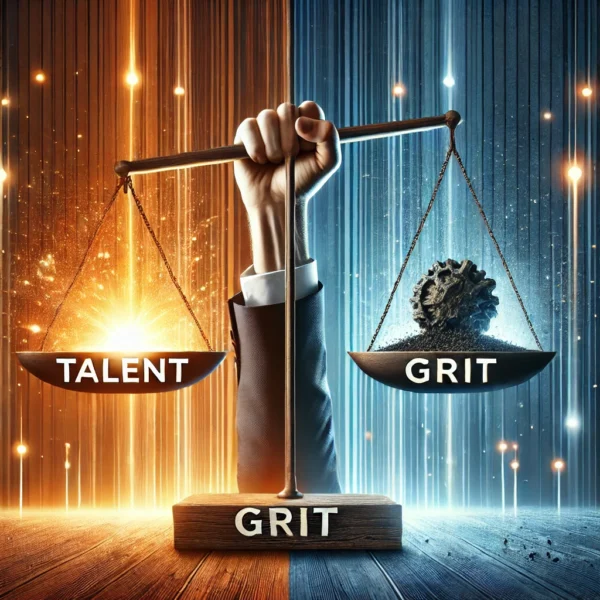Why Is GRIT More Important Than Talent for Success?
Why do some people manage to achieve success, even if they aren’t the most talented? The answer may lie in the power of grit – the ability to maintain focus, resilience and determination towards a long-term goal.
Angela Duckworth, in her book “Grit: The Power of Passion and Perseverance”, debunks the idea that innate talent is the main determinant of success. According to his research, it is the combination of purpose and persistence that really defines who thrives in competitive environments such as the corporate world.
In this article, we’ll explore how grit can be developed, what its relationship is with purpose, and how you can fill in a grit questionnaire and correlate it with various other aspects of your health. More than a skill, grit is a force that transforms careers and lives.
Part 1: Straight to the Point 🎯 – Basic Strategies and Practical Actions
Part 1, “Straight to the Point”, offers practical instructions and suggestions for immediate action.

1. Understand the Difference Between grit and Talent
While talent is widely seen as an innate trait – something you’re “born with” – grit is the ability to persist and dedicate yourself to long-term goals, even in the face of adversity. Angela Duckworth argues that talent without effort is an incomplete advantage. In the formula for success, effort counts twice, because it’s what transforms raw potential into concrete achievement.
Practical tip: Evaluate your effort versus talent in your current context. Ask yourself: “Am I using my talent consistently or can I step up my effort to achieve greater results?”
2. Connect grit to Purpose
Purpose is one of the main fuels of grit. When you are clear about why you are pursuing a goal, the likelihood of maintaining consistency and overcoming obstacles increases. Studies show that professionals with a strong sense of purpose have greater emotional resilience and are more productive.
Practical tip: Take a break to reflect on your purpose. Write down in a clear sentence: “Why am I doing what I do?”. Use this affirmation to reinforce your motivation in challenging moments.
3. Develop Your GRIT with Small Achievements
Grit doesn’t come overnight. It is built on small, consistent achievements that strengthen your self-confidence and resilience. Breaking down big goals into smaller, measurable objectives is a powerful strategy for staying focused and motivated.
Practical tip: Take a big goal that you want to achieve and break it down into smaller steps. For example, if the goal is a promotion at work, identify specific skills you need to develop and set deadlines for each one.
4. Monitor Your Level of grit
Grit, despite being a psychological trait, can be assessed and improved. In the corporate world, our online check-up includes a marker dedicated to measuring the level of grit. This simple but powerful indicator is used to identify areas where you can increase your determination and resilience.
Practical tip: Carry out the check-up to understand how your level of grit is affecting your performance at work. Use the results to plan concrete development actions.
5. Create Habits That Reinforce Persistence
Grit is not just a state of mind; it is formed by consistent habits. Determined people structure their day with routines that reinforce persistence, such as regularly reviewing goals, practicing gratitude and surrounding themselves with people who motivate them.
Practical tip: Create a simple habit that keeps you connected to your long-term goals. It could be writing a diary of your daily achievements or taking 5 minutes at the end of the day to reflect on the challenges you have overcome.
6. Ensure a Balance Between Physical and Mental Health
Grit requires mental and physical energy. Exhaustion, stress and emotional imbalance can compromise your ability to persist. That’s why taking care of your physical and mental health is essential to maintaining high levels of determination.
Practical tip: Assess how your physical and mental energy levels are at the moment. Exercise regularly, eat a balanced diet and prioritize sleep to ensure you have enough strength to keep going.
7. View Failure as Part of the Process
People with more grit understand that failure is not an end point, but a learning opportunity. Angela Duckworth points out that a growth mindset – the belief that skills can be developed with effort – is an essential component of grit.
Practical tip: Reflect on a recent failure. Ask yourself: “What can I learn from this to do better next time?”. Use this approach to turn challenges into fuel for your determination.
These strategies help develop and strengthen your grit, turning it into a competitive differentiator in the corporate world.
Part 2: Explaining the Concept Cientificamente👨🏻🔬 – Deepening your knowledge
Part 2, “Explaining the Concept Scientifically”, provides a scientifically-based in-depth look at the “whys” and explains in more detail the suggestions set out in Part 1

What is Grit and Why Does It Surpass Talent?
Angela Duckworth, in her renowned book “Grit: The Power of Passion and Perseverance”, defines grit as a combination of passion and perseverance towards long-term goals. She argues that while talent may determine the starting point, it is continuous effort that transforms potential into excellence.
Duckworth created a simple formula to illustrate this concept:
- Talent x Effort = Ability
- Ability x Effort = Achievement
In other words, effort has double weight in the equation for success, because it is what sustains the development of skills and the achievement of goals.
Psychology of grit and the Growth Mindset
Grit is closely linked to the growth mindset, a concept popularized by psychologist Carol Dweck. People with this mindset believe that skills can be developed with effort, practice and learning. This view allows individuals to see failure as an opportunity rather than an obstacle.
Studies show that professionals with high Grit are more likely to excel in challenging environments, as they can maintain their focus and motivation even in the face of setbacks.
Purpose: The Fuel of grit
Grit is sustained by a clear purpose. Duckworth points out that determined people not only work hard, but also find meaning in their goals. This higher purpose acts as a compass, guiding decisions and increasing emotional resilience in difficult times.
In the corporate environment, purpose is one of the main factors that differentiates resilient and highly productive leaders. Professionals who see their activities as part of a greater impact have more energy and persistence to overcome challenges.
Grit in the Corporate World
Why is grit a key marker?
In the corporate environment, grit is a differentiating skill. Professionals with high levels of determination and persistence are able to:
- Maintain productivity in high-pressure scenarios.
- Adapt quickly to changes and challenges.
- Turn ambitious goals into concrete achievements.
Our online check-up assesses, among other factors, each individual’s level of grit. Although it is a simple psychological marker, it is essential for identifying a professional’s ability to maintain resilience and motivation. Companies that adopt this metric are able to create more effective talent development and team-building strategies.
Scientific Studies Supporting the Role of Grip in Success
- Angela Duckworth’s research into High Performance Environments:
Duckworth studied cadets at military academies, spelling bee competitors and professionals from different fields. In all cases, grit was the most predictive factor of success, surpassing intelligence or natural abilities. - Harvard University study (2018):
Researchers found that professionals with high levels of grit had higher productivity and lower rates of emotional exhaustion in corporate environments. This is due to their ability to stay focused on their purpose, even in stressful situations. - Impact of Purpose on Health and Performance (The Lancet, 2020):
A study published in The Lancet showed that people with a strong sense of purpose not only have greater mental resilience, but also show better markers of physical health, such as lower chronic inflammation and lower cortisol levels.
How the Online Check-Up Boosts Grip Development
By taking the online check-up, you’ll get something much more than just physical and mental biomarkers. It includes a specific metric to measure your level of grit, giving you a clear picture of where you stand in terms of resilience and determination. This assessment is particularly useful in the corporate world, where grit is often the differentiator between good performance and excellence.
The results of the check-up allow you to identify critical areas that need development and create a personalized plan to increase resilience and motivation.
Conclusion
Grit is the engine behind success in any area of life, especially in the corporate world. More than talent, it is the ability to persist with purpose that defines those who achieve their goals. By combining passion and perseverance, you not only achieve your goals, but also overcome limits, turning challenges into opportunities.
If you want to improve your level of grit and gain deep insights into your performance and health, the online check-up is the first step. With it, you’ll be able to identify exactly where you are, plan your evolution and reach the next level of excellence.
Get in touch
https://klsellers.my.canva.site/keltontartarotti

Kelton Tartarotti, a specialist in Health, Longevity and Lifestyle Reprogramming, brings an innovative approach to corporate and personal well-being in the Tartarotti Report. With a comprehensive background in Physical Education, including a BA, BSc and post-graduate studies in the Physiological Basis of Personalized Training and Sports Nutrition, Kelton has a solid foundation in sports and health sciences.
He is registered with the Regional Council of Physical Education (CREF-ES) under number: 005334-G/ES
His experience includes:
International certification as a Personal Trainer by the World Fitness Association (Florida/USA)
Coaching training by ABRACOACH
Specialization in Integrative Functional Health
15 years as a physical trainer for elite MMA athletes in world events
Working as a Physical Trainer at the Espírito Santo Olympic Center (COES)
In the Tartarotti Report, Kelton offers valuable insights into:
Scientifically-based executive health protocols
Stress management and resilience techniques for leaders
Sleep optimization strategies for cognitive performance
Functional nutrition adapted to corporate life
Efficient exercise programs for busy schedules







